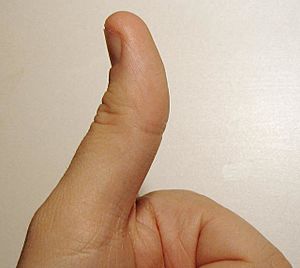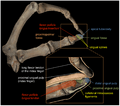Thumb facts for kids
A thumb is one of the five digits on your hand. It's special because it points in a different direction from your other four fingers. Thumbs also have only two bones, while your other fingers have three. This unique design makes thumbs very helpful for grabbing and holding things.
Contents
What Makes Thumbs Special?
Your thumb is different from your other fingers in a few key ways. It has fewer bones and can move in a special way. This movement allows it to touch the tips of your other fingers.
Opposable Thumbs
The ability of your thumb to move across your palm and touch your other fingers is called being "opposable." This is super important! It lets you grip objects, hold tools, and do many everyday tasks. Think about holding a pencil or opening a jar – you use your opposable thumb for these actions.
All primates, like monkeys and apes, have thumbs. However, humans have "fully opposable thumbs." This means our thumbs are even more flexible and useful. This special feature has helped humans develop and use tools effectively.
Thumb Bones
Each of your fingers has three bones called phalanges. Your thumb, however, only has two phalanges. This difference in bone structure contributes to its unique movement and strength.
Why Thumbs Have a Pulse
Your thumb contains an artery, which is a blood vessel that carries blood away from your heart. Arteries have a pulse, which is the rhythmic throbbing you can feel as blood pumps through. Because your thumb has its own pulse, it's not a good idea to use your thumb to check someone else's pulse. Your own thumb's pulse might confuse you!
Images for kids
-
A bonobo "fishing" for termites, showing how some animals use their thumbs.
Related Pages
See also
 In Spanish: Dedo pulgar para niños
In Spanish: Dedo pulgar para niños
 | Aaron Henry |
 | T. R. M. Howard |
 | Jesse Jackson |






